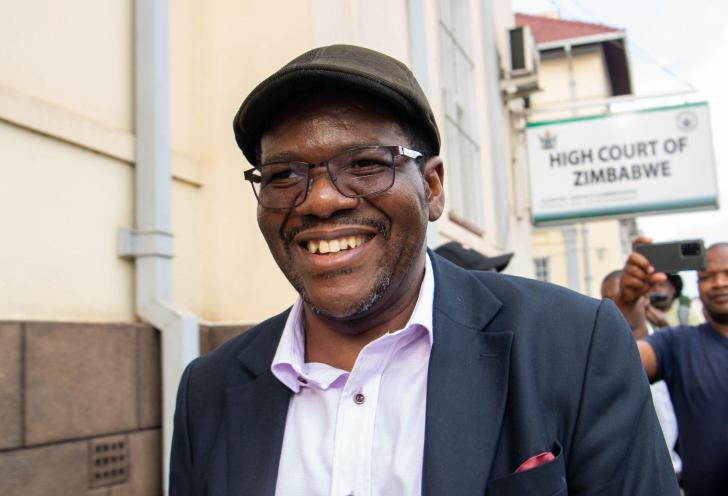News / National
CCC factions reject Tshabangu's GNU with Zanu-PF
15 May 2025 at 08:08hrs |
0 Views

Deepening divisions within the Citizens Coalition for Change (CCC) have erupted over a controversial proposal by self-proclaimed secretary-general Sengezo Tshabangu to extend President Emmerson Mnangagwa's term by two years and delay elections to 2030.
Tshabangu, whose legitimacy is under legal scrutiny, has sparked outrage across CCC factions after pushing for a government of national unity (GNU) with the ruling Zanu-PF, a move reminiscent of the 2009 power-sharing deal between the late Morgan Tsvangirai and former President Robert Mugabe.
Tshabangu's call comes amid mounting pressure from Mnangagwa loyalists seeking to extend the president's constitutionally mandated final term, which ends in 2028. However, the Constitution bars a sitting president from benefiting from any amendment that extends presidential tenure without a national referendum - a political risk Mnangagwa's backers appear reluctant to take.
Reacting to the proposal, CCC spokesperson Willias Madzimure dismissed it as a self-serving agenda, not reflective of the party's position.
"It's absurd that he is pushing for a GNU," Madzimure said. "The truth is we are not in a political crisis that calls for that arrangement. This is an individualistic decision. We should be pushing for electoral reforms so that we have a free and fair election in 2028."
Another CCC faction, represented by its spokesperson Promise Mkwananzi, also rejected Tshabangu's suggestion, branding it "nonsensical" and reaffirming the party's commitment to democratic elections in 2028.
Despite the backlash, Tshabangu's spokesperson Nqobizitha Mlilo stood by the proposal, saying critics within the CCC were entitled to their views. He maintained that dialogue with Zanu-PF was necessary, even as other opposition figures accused him of undermining the party.
Political analyst Pardon Taodzera criticized Tshabangu's proposal as "historically myopic and politically naive," warning that it trivializes the legacy of the 2009 GNU.
"The 2009 GNU was born out of a legitimate crisis - State-sanctioned violence, a collapsed economy and a disputed election that left Zimbabwe a pariah State," Taodzera said. "Today, while challenges persist, there is no comparable urgency."
He added that Tshabangu's actions risked turning the GNU into a tool for elite power retention rather than national reconciliation.
"It undermines the very democratic processes the opposition claims to champion," Taodzera said. "Tshabangu, a self-appointed secretary-general, lacks a mandate to negotiate on behalf of the opposition. His actions could fracture the CCC further, playing directly into Zanu-PF's strategy of divide-and-rule."
Tshabangu, who controversially seized control of the CCC from its founding leader Nelson Chamisa, is blamed for recalling dozens of CCC MPs and councillors - a move that triggered costly by-elections and handed key opposition seats to Zanu-PF.
With increasing resistance from within the CCC and growing public scrutiny, Tshabangu's GNU campaign appears to be deepening rifts within the opposition rather than presenting a viable path forward.
Tshabangu, whose legitimacy is under legal scrutiny, has sparked outrage across CCC factions after pushing for a government of national unity (GNU) with the ruling Zanu-PF, a move reminiscent of the 2009 power-sharing deal between the late Morgan Tsvangirai and former President Robert Mugabe.
Tshabangu's call comes amid mounting pressure from Mnangagwa loyalists seeking to extend the president's constitutionally mandated final term, which ends in 2028. However, the Constitution bars a sitting president from benefiting from any amendment that extends presidential tenure without a national referendum - a political risk Mnangagwa's backers appear reluctant to take.
Reacting to the proposal, CCC spokesperson Willias Madzimure dismissed it as a self-serving agenda, not reflective of the party's position.
"It's absurd that he is pushing for a GNU," Madzimure said. "The truth is we are not in a political crisis that calls for that arrangement. This is an individualistic decision. We should be pushing for electoral reforms so that we have a free and fair election in 2028."
Another CCC faction, represented by its spokesperson Promise Mkwananzi, also rejected Tshabangu's suggestion, branding it "nonsensical" and reaffirming the party's commitment to democratic elections in 2028.
Despite the backlash, Tshabangu's spokesperson Nqobizitha Mlilo stood by the proposal, saying critics within the CCC were entitled to their views. He maintained that dialogue with Zanu-PF was necessary, even as other opposition figures accused him of undermining the party.
Political analyst Pardon Taodzera criticized Tshabangu's proposal as "historically myopic and politically naive," warning that it trivializes the legacy of the 2009 GNU.
"The 2009 GNU was born out of a legitimate crisis - State-sanctioned violence, a collapsed economy and a disputed election that left Zimbabwe a pariah State," Taodzera said. "Today, while challenges persist, there is no comparable urgency."
He added that Tshabangu's actions risked turning the GNU into a tool for elite power retention rather than national reconciliation.
"It undermines the very democratic processes the opposition claims to champion," Taodzera said. "Tshabangu, a self-appointed secretary-general, lacks a mandate to negotiate on behalf of the opposition. His actions could fracture the CCC further, playing directly into Zanu-PF's strategy of divide-and-rule."
Tshabangu, who controversially seized control of the CCC from its founding leader Nelson Chamisa, is blamed for recalling dozens of CCC MPs and councillors - a move that triggered costly by-elections and handed key opposition seats to Zanu-PF.
With increasing resistance from within the CCC and growing public scrutiny, Tshabangu's GNU campaign appears to be deepening rifts within the opposition rather than presenting a viable path forward.
Source - newsday
Join the discussion
Loading comments…






























